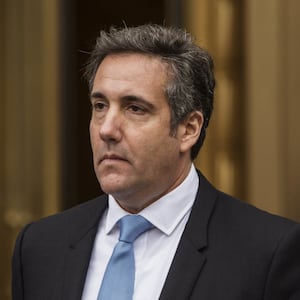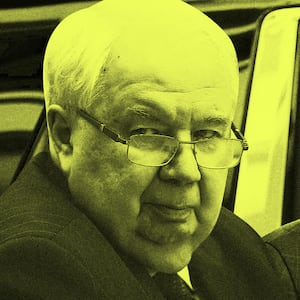Nearly two years after the appointment of Robert Mueller as special counsel, Attorney General William Barr has submitted a 448-page report to Congress penned by Mueller and a team of investigators detailing Russian interference in the 2016 presidential election in support of President Donald Trump, as well as ten instances of potential obstruction of justice on the part of the president.
According to the report, based on hundreds witness interviews and the examination of thousands of documents furnished by the White House and the Trump campaign, the president waged a public and private campaign to discourage potential witnesses from cooperating with the investigation, and privately attempted to “control” the investigation as it delved into the conduct of himself and his closest advisors during and after the presidential campaign.
Meanwhile, some of his closest aides and advisors alternately attempted to curtail the president’s potentially destructive impulses or cover them up—even lying to the press.
ADVERTISEMENT
While the special counsel determined in the report that “the Constitution does not categorically and permanently immunize a president for obstructing justice,” inquiries intended to determine whether the president obstructed justice with a corrupt motive “should not impermissibly chill his performance of his constitutionally assigned duties.”
Congress, however, may apply the obstruction laws to the president’s actions with more liberty, Mueller said. “The conclusion that Congress may apply the obstruction laws to the president 's corrupt exercise of the powers of office accords with our constitutional system of checks and balances and the principle that no person is above the law.”
Here are some of the report’s highlights:
Trump: ‘I’m Fucked’
According to the report, the president had a near-meltdown after learning that Mueller had been appointed on May 17, 2017, to investigate his campaign’s potential ties with the Russian government—screaming that then-Attorney General Jeff Sessions had “let [him] down,” and that “you were supposed to protect me.”
According to Sessions’ recollection, Trump “slumped back in his chair” and said, “Oh my God. This is terrible. This is the end of my presidency. I’m fucked.”
Trump then began lashing out at Sessions, asking “how could you let this happen?”
“Everyone tells me if you get one of these independent counsels it ruins your presidency,” Trump said, according to Sessions. “It takes years and years and I won’t be able to do anything. This is the worst thing that ever happened to me.”
The president then told Sessions that he should resign, a demand to which Sessions originally agreed before backing off, the report says. According to former White House communications director Hope Hicks, the president was more despondent than she had seen at any other point than the publication of the Access Hollywood tape.
Trump Screamed ‘I Don’t Have A Lawyer’ After Sessions’ Recusal
One day after Sessions recused himself from overseeing the special counsel investigation, Trump met with then-White House chief of staff Reince Priebus, then-White House advisor Steve Bannon and White House Counsel Don McGahn in the Oval Office—opening the conversation by stating that “I don’t have a lawyer,” and bringing up that he wished former mentor and all-around crook Roy Cohn could be his attorney.
Citing Bannon, the special counsel report states that Trump grilled McGahn about the relationships between other presidents and their attorneys general. “You’re telling me that Bobby and Jack [Kennedy] didn’t talk about investigations? Or Obama didn’t tell Eric Holder who to investigate?” Bannon recalled that Trump “was as mad as Bannon had ever seen him and that he screamed at McGahn about how weak Sessions was.”
Sessions, according to the report, “had the impression that the president feared that the investigation could spin out of control and disrupt his ability to govern.” It was the then-attorney general’s feeling that if he had not recused, Trump felt he “could have helped avert” that disruption.
McGahn Refused to Participate In ‘Saturday Night Massacre’
According to the report, “substantial evidence” supports the conclusion that Trump ordered McGahn to order Deputy Attorney General Rod Rosenstein, who oversaw the Mueller investigation following Sessions’ recusal, “to have the special counsel removed.” McGahn resisted ordering Mueller’s firing at Trump’s behest in June 2017, saying that he did not want to “participate in events that he described as akin to the Saturday Night Massacre,” when President Richard Nixon ordered Attorney General Elliott Richardson to fire Archibald Cox, the special prosecutor that was investigating Watergate. Richardson resigned rather than follow that order, as did his deputy attorney general, whom Nixon fired.
McGahn, the report says, called his lawyer, drove to White House, and packed his office in anticipation of submitting a letter of resignation. McGahn told Priebus that the president had asked him to “do crazy shit.” Priebus and Bannon urged McGahn not to quit, and McGahn ultimately backed down from his attempt to resign—as the president backed down from his demand that McGahn order Mueller’s firing.
According to the report, Trump would later float the possibility of firing McGahn for not lying about Trump’s order to fire Mueller. In a request to then-White House Staff Secretary Rob Porter, Trump asked him to “create a record” asserting that he had never ordered McGahn to push for Mueller’s firing. Porter, who resigned after being accused of domestic abuse by both of his ex-wives, told the special counsel that Trump said something to the effect of “if he doesn’t write a letter, then maybe I’ll have to get rid of him [McGahn].”
The special counsel report notes that “substantial evidence indicates that in repeatedly urging McGahn to dispute that he was ordered to have the special counsel terminated, the president acted for the purpose of influencing McGahn’s account in order to deflect or prevent further scrutiny of the president’s conduct towards the investigation.”
Trump Ordered Lewandowski to Get Sessions to Cover For Him
Two days after telling McGahn to fire Mueller and end the investigation, Trump “made another attempt to affect the course of the Russia investigation,” according to the special counsel report. During a one-on-one meeting with former campaign manager Corey Lewandowski, the president “dictated” a message for him to give Sessions.
That message: Sessions should publicly announce that, notwithstanding his recusal from the Russia investigation, the investigation was “very unfair” to the president, and that the president had done nothing wrong. At another private meeting a month later, Trump asked Lewandowski about the message to Sessions “to limit the special counsel investigation to future election interference,” which Lewandowski reassured Trump “would be delivered soon.” Hours after that meeting, Trump lashed out at Sessions in an interview with the New York Times, saying that he would have selected another attorney general if he had known Sessions would recuse himself.
Lewandowski did not want to deliver the president’s message personally, according to the report, so he asked senior White House official Rick Dearborn to deliver it. “Dearborn was uncomfortable with the task and did not follow through,” the special counsel notes.
Trump’s Lawyers to Cohen: ‘Stay On Message’
Longtime Trump attorney Michael Cohen, who is serving three years in federal prison on charges of tax fraud and lying to federal investigators, told a judge in December that he had covered up the president’s “dirty deeds.” According to the special counsel report, evidence exists that Cohen’s coverups were encouraged by the president and his legal team, who, Cohen alleges, told him to “stay on message” and not contradict Trump during congressional testimony.
According to the report, Trump’s conduct towards Cohen “changed from praise… when he falsely minimized the president's involvement in the Trump Tower Moscow project, to castigation of Cohen when he became a cooperating witness.”
Cohen told Mueller that ahead of congressional testimony in 2017 in which he lied to Congress about the number of times he had briefed Trump about the project, Trump’s personal counsel told him to “stay on message” and not contradict Trump on the matter. After the FBI searched Cohen’s home and office in April 2018, Trump privately passed messages of support to Cohen, who discussed pardons with Trump’s personal attorneys.
After Cohen began cooperating with the special counsel in the summer of 2018, Trump publicly called him a “rat.”
Mueller later determined that while there was evidence that Trump knew Cohen had provided false testimony to Congress about the project, “the evidence available to us does not establish that the president directed or aided Cohen’s false testimony.
Trump Encouraged Witnesses ‘Not to Cooperate’
Following the firing of James Comey as director of the FBI and the appointment of Mueller as special counsel, the report states, the president’s behavior towards the FBI and its investigation into Russian interference in the election became hostile, both in public and private: “At that point, the president engaged in a second phase of conduct involving public attacks on the investigation, non-public efforts to control it, and efforts in both private and public to encourage witnesses not cooperate with the investigation.”
While the president’s public attempts to tell witnesses not to cooperate with the investigation were “unusual,” the report states, “no principle of law excludes public acts from the reach of the obstruction laws. If the likely effect of public acts is to influence witnesses or alter their testimony, the harm to the justice system’s integrity is the same.”
President Trump’s statements that he “felt badly” for former campaign chair Paul Manafort and that “a lot of it is very unfair,” Mueller contends in the report, “combined with the president’s commendation of Manafort for being a ‘brave man’ who ‘refused to break,’ suggested that a pardon was a more likely possibility if Manafort continued not to cooperate with the government.”
The special counsel contended that “some evidence supports a conclusion that the President intended, at least in part, to influence [Manafort’s] jury,” but said that “alternative explanations” for Trump’s comments —including that “he genuinely felt sorry for Manafort”—prevented a firm contention that the president had a corrupt intent behind his encouragement.
Mueller: Trump Told Comey to Kill Flynn Investigation
One day after the resignation of Michael Flynn as national security advisor, Trump met with Comey in the Oval Office and told him that he “hope[d] you can see your way clear to letting this go, to letting Flynn go,” adding that he was “a good guy.” Comey would later tell Congress that he understood those remarks to be a request to “drop any investigation of Flynn in connection with false statements about his conversations with the Russian ambassador.”
According to Mueller’s analysis, the circumstances of that conversation “show that the president was asking Comey to close the FBI’s investigation into Flynn.”
“[B]ecause the president is the head of the Executive Branch, when he says that he ‘hopes’ a subordinate will do something, it is reasonable to expect that the subordinate will do what the president wants,” Mueller determined.
Why Mueller Didn’t Subpoena President Trump
Trump’s legal team was prepared to wage a war to keep the president from being subpoenaed into testifying under oath before the special counsel, but that battle never came—Mueller never sought to legally compel the president to testify. In the report, the special counsel writes that while lawyers had determined that the special counsel possesses both the authority and the legal justification to issue a grand jury subpoena, he declined, “in view of the substantial delay that such an investigative step would likely produce at a late stage in our investigation.”
Mueller also felt that, “based on the significant body of evidence we had already obtained of the president’s actions and his public and private statements describing or explaining those actions,” investigators had sufficient evidence to assess the truthfulness of the president’s testimony.
‘Some Evidence’ Trump Knew of Flynn’s Conversations with Russian Ambassador
Flynn served as national security advisor for a mere 24 days before his resignation, after reports surfaced that he had lied to Vice President Mike Pence about the nature of his past conversations with Russian ambassador Sergey Kislyak. During the transition, Flynn had discussed rolling back Obama-era sanctions on Russia and Russian citizens with the ambassador, and then lied to the FBI about those conversations, a crime to which he pleaded guilty and has not yet been sentenced—in part because he has “substantially” assisted the Mueller investigation, according to a sentencing memo released in December 2018.
According to the report, “some evidence suggests that the president knew about the existence and content of Flynn’s calls when they occurred, but the evidence is inconclusive and could not be relied upon to establish the president’s knowledge” until White House Counsel McGahn was informed by then-Acting Attorney General Sally Yates that Flynn had been “compromised” by the Russian government.
Manafort Shared Campaign Data With Former Russian Intelligence
As suggested months ago in court filings, the report states that Manafort shared Trump campaign polling data with alleged former Russian intelligence officer and longtime pal Konstantin Kilimnik during a 2016 meeting about a potential peace plan in Ukraine, which has been under partial occupation since Russia invaded and annexed the Ukrainian region of Crimea in 2014.
“Both men believed the plan would require Trump's assent to succeed” if he were to be elected, the report states, noting that Manafort and Kilimnik “also discussed the status of the Trump campaign and Manafort’s strategy for winning Democratic votes in Midwestern states.” Months before that meeting, Manafort “caused internal polling data to be shared with Kilimnik and the sharing continued for some period of time.”
Sarah Sanders Admitted She Made Up ‘Rank-and-File’ Criticism of Comey
After Trump fired Comey in May 2017, then-deputy White House press secretary Sarah Huckabee Sanders told reporters in a press conference that “the rank and file of the FBI had lost confidence in their director,” prompting Comey’s firing. When told by a reporter in the briefing that the vast majority of FBI agents supported the former director, Sanders responded that she had heard “from countless members of the FBI that say very different things.”
When asked by the special counsel about the source of that statement, Sanders described the statement as a “slip of the tongue,” made in the heat of the moment “that was not founded on anything,” according to the report.
Jared Kushner Gave Russian-Made ‘Reconciliation Plan’ to Rex Tillerson
After being introduced to a friend of Jared Kushner—the presidential son-in-law and White House advisor—Kirill Dmitriev, the chief executive officer of Russia's sovereign wealth fund, collaborated with the friend on a “short written reconciliation plan for the United States and Russia” during the presidential campaign. The plan, Dmitriev intimated, had been approved by Russian President Vladimir Putin.
That friend, the report states, gave the proposal to Kushner before the inauguration, and “Kushner later gave copies to Bannon and incoming Secretary of State Rex Tillerson.”








